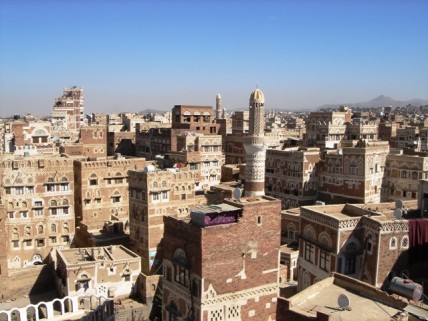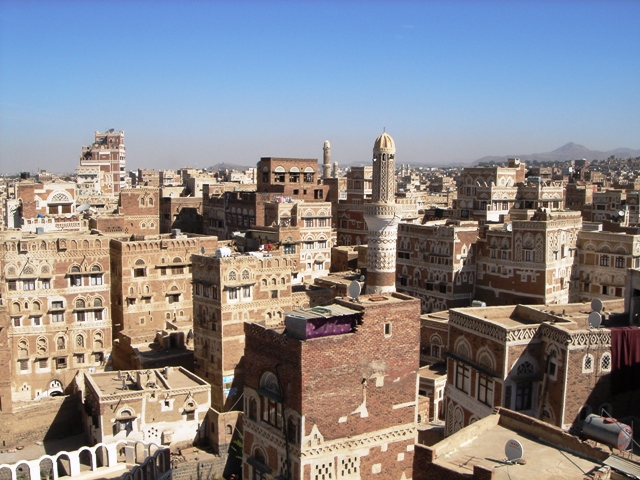
Sana’a, Yemen. Photograph by Shoestring/Wikitravel
The deadly attacks on Yemen’s defence ministry that killed 52 people in early December have renewed speculation about the threat posed by al-Qaeda in the Arabian Peninsula (AQAP). AQAP, which has claimed responsibility for the attack, is thought to be the organisation’s leading operational wing.
AQAP claimed the Yemeni defence ministry complex had been targeted because US unmanned drones were being operated from it. These latest incidents come only months after AQAP leaked plans for another attack, prompting the closure of US and other foreign embassies in Yemen and beyond. But it is easy to overlook the fact that this was a local target, not an international one. In fact, the attack is an example an old Islamist tactic, “think global, act local”, which is increasingly replacing Osama bin Laden’s model of remote struggle.
The way AQAP is pursuing this strategy makes Yemen a microcosm of the global state of al-Qaeda: while lip service is still paid to a vision of attacking the international, global enemy, the actual battleground is increasingly domestic. For a meaningful assessment of AQAP, it is important to place the group’s activities into the complex and unstable politics of Yemen. In this contested state, AQAP has become increasingly involved in the local struggle for political legitimacy – and it is competing for influence against a range of actors on a number of fronts.
Al-Qaeda’s Yemeni rivals
Recent headlines have heralded AQAP’s violent struggle with the Shia Houthi rebels, a group that seeks the establishment of an imamate in Yemen but has not so far advanced a coherent political program. The same can be said for AQAP, which has little to offer in terms of a political strategy beyond the espousal of violent jihad. But despite their shared enmity with the Yemeni government, there is little love lost between AQAP and the young Houthi rebels, or “Believing Youth”, whose ideologies are poles apart.
At a time when sectarian differences are becoming ever more stark, it remains unlikely that AQAP and the Houthi rebels will look for common ground – especially since both specialise in violence, rather than the art of organised political bargaining. Indeed, the recently confirmed killing of more than 120 Sunni Muslim jihadists in fighting with the Houthi rebels seems to confirm AQAP’s commitment to violence over anything resembling diplomacy.
Another influential political force is the Southern secessionist movement. The unification of 1990 is still resented in the south of the country, where prosperity and standard of living have long been in decline, and a loose movement of populist anti-government protest has arisen in response. But this is not a jihadist movement; on the contrary, the government has previously used jihadi militias to put down these “socialist unbelievers”. It is therefore highly unlikely that the Southern Movement will have sympathy for AQAP or its particular brand of Islam.
In fact, AQAP supporters have gone out of their way to explain to the secessionists that their war is against the US and its allies, and not against the Yemeni army and fellow Muslims. As al-Qaeda’s leaders proclaimed at a 2009 rally: “We carry bombs for God’s enemies; soldiers, you must know that we do not want to fight you.” But to convince the socialist radicals that their claim to comradeship is genuine, AQAP would need to change its bloody means of pursuing its goals and moderate its harsh and narrow interpretation of Islam.
Meanwhile, the latest development in Islamist politics in Yemen is the rise of Ansar al-Sharia (“Partisans of Sharia”), a group that emerged in the South and captured towns in the governorates of Abyan and Shabwa. While Yemeni authorities insist that the group is the same as al-Qaeda, most analysts maintain that Ansar al-Sharia is more a mixture of AQAP and other groups and factions, and likely a splinter of AQAP as the result of internal disagreement over goals and tactics. But while the relationship between AQAP and Ansar al-Sharia is as yet unclear, the new group is already making a considerable impact.
For instance, it has taken steps to provide public services in the south where the government does not; some observers have taken this to mean that Yemeni Islamists are now involved in nation building. These activities mark a clear move away from AQAP’s policy of violence, even as Ansar al-Sharia holds to a broadly similar religious-political Islamist ideology. Above all, the growing strength of Ansar al-Sharia indicates that the influence of AQAP, whether by words or deeds, as well as its internal coherence, is under threat.
These three groups, however, are only the most visible actors in Yemen’s Islamist power struggle. Others besides demand closer examination: for example, the Zaydi revivalists, a moderate, tolerant Shia sect, close in their beliefs to Sunni muslims. The many different groups within the Zaydi revivalist movement, while hardly homogenous, have little in common with AQAP.
Another faction is the Salafists, an apolitical group formed around the late Muqbil al-Wadi’i. They stand out for their condemnation of violence; indeed, al-Wadi’i is reported to have been an outspoken critic of jihadists’ strategies, and accused bin Laden of preferring to invest in weapons rather than mosques. Maintaining this position, Muhammad al-Imam, another charismatic member of the group, condemned jihadi violence against the US-led occupation in Iraq in 2003. As such, the Yemeni Salafists stand in direct opposition to the violence employed by AQAP.
A crowded field
These different actors represent a number of Islamist standpoints on the question of governance and political legitimacy in Yemen; they provide a wide range of viable alternatives to the narrow, violent logic of jihad espoused by AQAP.
In the power vacuum that is emerging as the Yemeni president, Abd Rabbuh Mansur Hadi, struggles to impose unity, these expressions of difference are bound to become better defined. And with the old regime gone, leadership of the country is up for grabs, setting the stage for a prolonged struggle for supremacy in which AQAP are just one actor. In this context, the quality of the country’s internal debate and the way leadership emerges within the Yemeni community, will be crucial in determining AQAP’s future.
Correspondingly, AQAP’s place in the country will also depend on its ability to bargain effectively – a task for which it is poorly prepared, still being dedicated to the use of semi-professional explosive devices. Indeed, if the case of al-Qaeda in Iraq is anything to go by, reliance on violence alone is not a useful way of establishing a strong power base. A violent approach will most likely relegate AQAP to the fringes of the complex Yemeni arena, and will certainly not put it at the centre of public and political life.
By Christina Hellmich, University of Reading
Christina Hellmich does not work for, consult to, own shares in or receive funding from any company or organisation that would benefit from this article, and has no relevant affiliations.
![]()




